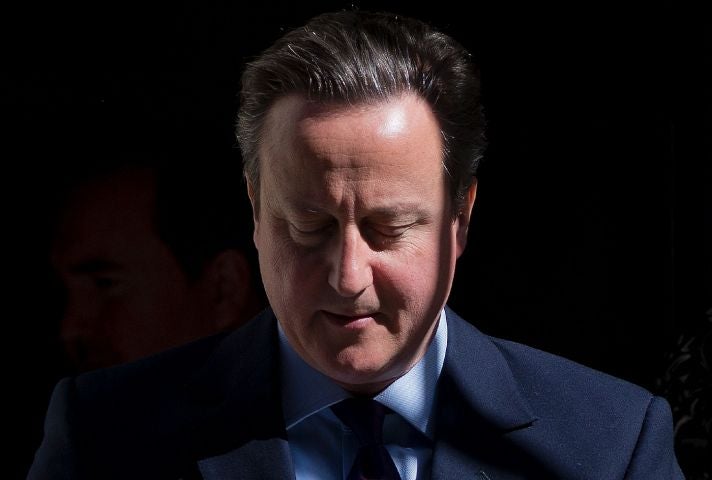What has happened to the economy under a year of Tory government – in six charts
Growth is down, share prices are lower, wages are flat, inflation is weak, productivity is falling and unemployment went up

On 7 May 2015 - exactly a year ago - David Cameron’s Conservatives won a surprise majority in the general election, their first outright majority since 1992 under John Major. That meant the Tories could govern the country free of any coalition with another party.
So how have they used that power? And how has the economy performed? Below we look at what’s happened to the economy under the past 12 months of Tory Parliamentary hegemony.
Growth
Growth in the economy has slowed considerably since last May. The most recent official figures suggest GDP expanded by 0.4 per cent in the first quarter of this year – down from 0.6 per cent in the final quarter of 2015:
And the latest disappointing round of surveys last week suggests that growth could dip to 0.1 per cent in the second quarter of the year - or maybe even dry up altogether. Many economists are blaming this slowdown on David Cameron’s decision to hold a referendum on Britain’s EU membership and the paralysing uncertainty it has caused.
Jobs
David Cameron trumpeted Britain’s “jobs miracle” under his leadership in the 2015 election campaign. He has promised further significant employment growth in this Parliament. Unemployment did fall for most of 2015. But in the three months to January it unexpectedly rose again, by 21,000:
This may be a blip. But it will still certainly be difficult to achieve many more reductions in the jobless numbers - especially while the economy is slowing.
Productivity
Having ignored Britain’s terrible productivity performance during the Coalition years David Cameron and George Osborne have begun to talk about the need to tackle it over the past year. But after two quarters of reasonable growth following the election the final quarter of 2015 saw the weakest quarterly productivity performance since the 2008-09 financial crisis, when output per hour fell 1.2 per cent:
It was this lamentable figure that prompted the Office for Budget Responsibility to revise down its forecast for productivity growth over the rest of the Parliament, meaning weaker growth, leading to weaker tax revenues, leading to a deterioration in the outlook for the public finances.
Inflation
When the Tories won the election consumer price inflation was close to zero. The general expectation was that this would not last very long and a recovery in the global oil price would push up prices again back towards the Bank of England’s 2 per cent target. But global oil prices have remained extremely weak – and so has UK consumer price growth.
The latest figures show annual price growth of 0.5 per cent, still well below the official target. Weak price growth is good for shoppers. But if it stays too low for too long it can cause problems for the wider economy.
Wages
Wages, adjusted for consumer price inflation, were still well below their peak in 2008 at the time of last year’s general election. And since then wages in cash terms have grown disappointingly slowly. In February they were just £493 a week, barely any higher in real terms than a year earlier. The Bank of England has suggested that weak consumer inflation is one of the reasons, as employers have bargained employees down in pay settlements by citing subdued rises in the cost of living.
The introduction of the “National Living Wage” for low income workers last month has not yet made an impact on the official figures.
Share prices
Another reason why businesses might have been loath to raise their employees' pay is that investors are still nervous about the overall economic outlook. Share prices have been hit hard since last year’s election, largely due to global financial turmoil from China. But fears over possible Brexit might also be responsible. The FTSE All-share index of UK companies is below where it was when David Cameron returned to Downing Street last May:
All things considered, these are not the economic figures the Conservatives would have been hoping for when David Cameron re-entered Downing Street 12 months ago at the head of a majority Conservative government.
Subscribe to Independent Premium to bookmark this article
Want to bookmark your favourite articles and stories to read or reference later? Start your Independent Premium subscription today.

Join our commenting forum
Join thought-provoking conversations, follow other Independent readers and see their replies